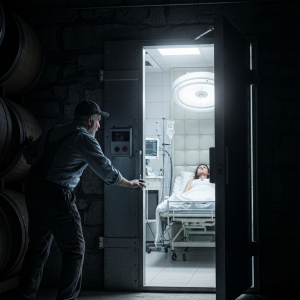My mother is the most baby-obsessed person I have ever met, a fanatic whose devotion to procreation borders on the pathological. Her obsession shaped every moment of my childhood. Starting when I was just eight years old, she forced me and my older sister, Dianiela, to wear these grotesque pregnancy simulation suits for hours every single day. They were heavy, sand-filled contraptions, twenty pounds strapped to our small stomachs while we were made to practice Lamaze breathing exercises and watch graphic birthing videos. If we complained about the searing back pain, she would simply add more weight and tell us, “Real mothers don’t whine.”
Our playtime was replaced with “maternal training.” She made us practice breastfeeding with creepy, lifelike dolls that would emit a piercing electronic wail if you didn’t hold them at the correct angle. While I spent every session plotting my eventual escape from this domestic prison, Dianiela embraced it as if it were her one true purpose in life. She would waddle around the house with perfect posture, rubbing her fake belly and cooing to it out loud. By the time she was sixteen, she was begging our mother to let her be a “practice surrogate” for one of her mother’s infertile work friends.
When Dianiela turned eighteen, our mother threw her a massive party. Not to celebrate her high school graduation, but to celebrate her signing her first official surrogacy contract. Relatives and friends of my mother gathered, calling Dianiela a “blessing” and an “angel,” while I sat in the corner, feeling like I was at a livestock auction where my sister was the prize breeding cow.
Within three years, Dianiela had carried three babies for three different couples. Each time she came home from the hospital, her body weaker, her eyes more hollow, my mother would parade her around town like a war hero. “Look at my generous daughter,” she would boast, “giving the gift of life.”
Meanwhile, I was pursuing a biomedical degree, volunteering at women’s shelters, and learning about things like bodily autonomy and medical ethics. But in my mother’s eyes, none of that mattered. “Such a waste of a perfectly good uterus,” she would tell anyone who would listen, often in front of me. “Her sister has blessed three families while this one hoards her fertility for herself.”
The most terrifying part was watching Dianiela physically deteriorate. After her fourth pregnancy at the age of twenty-two, she could barely walk without a grimace of pain. Her hips were a wreck, she had constant infections, and her hair was falling out in chunks. When I tried to talk to her about it, to express my concern, she grabbed my hands, her eyes filled with a desperate, feverish light. “Maria, this is what I was made for,” she whispered, tears streaming down her face. “My body is a vessel for miracles. Why can’t you understand that?” That’s when I knew my mother’s indoctrination was complete. Dianiela was gone.
So, I played along. I created a careful facade of compliance to keep my mother off my back. I told her I was “considering” pregnancy. I wore looser clothes to family events. I would leave my laptop open to pages for fertility clinics when I knew she would be walking by. All the while, I was secretly studying for the LSAT and applying to law schools across the country. I ended up specializing in reproductive rights and medical ethics, spending the next several years of my life helping women escape the very kinds of coercive situations my mother had tried to create for me. By twenty-eight, I was a partner at my firm, making a real difference.
So when my mother invited me to a “celebration dinner” for Dianiela, I figured it was just another pregnancy announcement. I was wrong. It was an intervention, and I was the one being ambushed.
We were seated at a long dining table, just my mother, a heavily pregnant Dianiela, and me. “Sweetie, you’re not getting any younger,” my mother announced, her voice syrupy sweet. “So, I’ve taken the liberty of starting your fertility treatments for you.”
Before I could even process her words, she pulled a syringe filled with a clear liquid from her purse. “Just a little boost to get those eggs flowing.” I recoiled, jumping back from the table, but Dianiela, surprisingly strong, grabbed my arms from behind, pinning me to my chair. “Please, Maria, just try it,” she pleaded, her voice breathy in my ear. “I’ve already found the perfect couple for your first baby.”
I screamed and fought, but my mother was already advancing on me with the needle. That’s when I saw the other syringes laid out neatly on a side table. They had been planning this. As my mother plunged the needle deep into my thigh, I felt the cold liquid burn through my muscle. Within minutes, my vision began to blur, and a searing, fiery pain erupted in my abdomen. Through the haze, I heard my mother on the phone. “Yes, we’ve started the protocol,” she was saying. “She’ll be ready for harvest in two weeks.” That’s when I realized this wasn’t just about family pressure anymore. This was trafficking.
I woke up in the ICU. The first thing I saw was the sterile white ceiling tiles, the first thing I felt was a dull, throbbing ache deep in my pelvis. I had a severe case of Ovarian Hyperstimulation Syndrome, so critical that the doctors had nearly been forced to perform a hysterectomy. My mother was standing over me, her expression not of concern, but of stern disappointment. “We only brought you here because we wanted to save your womb,” was the first thing she said to me.
I pressed the red call button for the nurse. The moment she entered, a kind woman with tired eyes, she took one look at my mother’s imperious stance and gently but firmly escorted her out to perform a private examination. As soon as we were alone, her professional demeanor melted away. She wrapped her arms around me and asked if I was okay. I broke down, the full horror of the situation washing over me, and I unloaded everything—the surrogacy, the favoritism, the forced injection. She listened, her shock turning to a cold fury. With the help of that one nurse, I was about to make my family pay.
She returned twenty minutes later with a uniformed officer, Detective Rodriguez, from the domestic violence unit. He specialized in cases of reproductive coercion. As he was setting up his recorder, my mother reappeared, trying to push through a secure door down the hall. She saw me looking and pressed her face against the glass, mouthing the words, ‘Ungrateful bitch.’
My phone, on the bedside table, started buzzing relentlessly. It was Dianiela. ‘How could you involve the police? Mom was HELPING you! You’re destroying our family!’
Detective Rodriguez’s expression darkened. “This isn’t the first complaint we’ve received about forced fertility treatments,” he said grimly. “There’s been a pattern, particularly involving certain clinics.” He then asked me a question that made my stomach drop. “Your mother, does she work in the medical field?”
“She’s a receptionist at the Blessed Beginnings Fertility Clinic,” I whispered.
Before he could respond, a hospital social worker entered. She froze when she saw my name on the chart. “Maria Gonzalez? Your mother is Patricia Gonzalez?” she stammered, clutching her clipboard. “We’ve… had some interactions.” She was clearly terrified, fumbling with pamphlets and avoiding my eyes. I knew then that my mother’s influence ran deep. I grabbed my phone and logged into my medical portal. There it was: my medical power of attorney had been changed to my mother three months ago. The signature was a convincing, but definite, forgery.
Just then, a man in an expensive suit strode into the room. “I’m representing Patricia Gonzalez,” he announced. “I understand there’s been a misunderstanding. Maria is clearly suffering from hormone-induced psychosis. We’re requesting an immediate psychiatric evaluation.”
I was trapped. Every protest I made was twisted into a symptom of my supposed instability. My own law firm, which my mother had called, believed her story and told me to “focus on getting better.” Through the window, I saw her showing my apartment and car keys to her lawyer, reciting my work schedule from memory. She had been planning this for years.
The evaluation was a farce. The psychiatrist, Dr. Whitfield, was a member of my mother’s book club. Every question was a trap. When I spoke of my career helping women, she called it a “projection of my internal conflicts.” She showed me photos of baby dolls she claimed were found “hidden in my closet,” evidence of my “fertility grief.” She recommended a 72-hour psychiatric hold for observation. The system my mother had so expertly manipulated was closing in around me. As they prepared to transfer me, the kind nurse slipped a piece of paper into my hand. It was a phone number. “Call it when you can,” she whispered. “There are more of us than you think. Women who’ve seen what happens at that clinic. We’ve just been too scared to speak up
The psychiatric ward was a sterile, white prison. My new room had a narrow bed with restraint straps and a small, reinforced window. I was trapped in a bureaucratic maze designed to look like treatment. My mother arrived that afternoon, not with flowers, but with a suitcase. She unpacked maternity clothes, prenatal vitamins, and a journal titled ‘My Fertility Journey,’ with the first few pages already filled out in handwriting that looked eerily like mine.
“The retrieval is scheduled for next week,” she said conversationally, as if discussing the weather. “Dr. Martinez at the clinic is very optimistic about your egg quality.” I told her I wasn’t consenting. “Of course not, dear. Not in your current state,” she said with a placid smile. “That’s why I’ve petitioned for temporary medical conservatorship. It’s just until you’re thinking clearly again.”
I knew what that meant. Once she had conservatorship, she could consent to anything on my behalf. The night nurse, an older woman with tired eyes, slipped into my room after midnight. She was a friend of the first nurse who had helped me. “She asked me to give you this,” she whispered, pressing another small piece of paper into my hand. It was a phone number. “Call it when you get out. There are people who will help.”
I knew I couldn’t fight them head-on. To prove I was sane, I had to act insane by their standards. To escape, I had to perform. The next morning, I began the most important acting job of my life. During group therapy, I let my voice crack as I spoke of a fabricated dream about holding a baby. I apologized to Dr. Whitfield, feeding her a narrative about my jealousy of Dianiela and my fertility grief. I let my mother dress me in the maternity clothes, rubbing my flat stomach and telling her how “natural” it felt.
Dr. Whitfield was so impressed with my “breakthrough” that she recommended my immediate release. My mother was ecstatic. She had an appointment scheduled for me at the Blessed Beginnings clinic that afternoon, the same time as the conservatorship hearing at the courthouse.
When I was released the next morning, my mother was waiting. I convinced her to take me to my apartment first, to “change clothes and feel normal again.” While she waited in the living room, I locked myself in the bathroom and made the most important call of my life, to a colleague I had emailed from the hospital computer. “The hearing is at 2 p.m.,” I whispered. “I can’t make it. My mother will have me at the clinic. Check my work email. The password is… Everything is in a folder labeled ‘PERSONAL’.”
We arrived at the fertility clinic at 1:30. At 2:15, I excused myself to the bathroom, slipped out a side door, and called a ride-share. I burst into the courtroom at 2:25, just as the judge was about to hear my mother’s petition.
My colleague stood at the respondent’s table, looking immensely relieved to see me. My mother’s face went from white to a blotchy, furious red. “Your Honor,” I said, my voice ringing with a clarity I hadn’t felt in days, “I am here of my own free will, and I would like to contest this conservatorship petition.”
The next hour was brutal. My mother’s lawyer presented Dr. Whitfield’s evaluation, painting me as a delusional, unstable woman. But my colleague countered with the evidence I had gathered: the forged signatures, the timeline of my mother’s planning, and the sworn testimony from the nurse who had been fired for helping me. That nurse had called the number she’d given me, connecting with an underground network of women who had been victimized by the clinic. They had been waiting for a case like mine.
“Your Honor,” I said when it was my turn to speak. “I don’t have fertility grief. I have a mother who has built her entire identity around her daughters’ reproductive capacity. She drugged me, forged legal documents, and orchestrated a campaign to destroy my credibility, all because I refused to participate in her breeding agenda.”
The judge, a stern woman in her sixties, listened intently. After reviewing the evidence, including a hair follicle test that proved I had been drugged, she made her decision. “The petition for conservatorship is denied,” she said firmly. “Furthermore, I am issuing a permanent restraining order. Patricia Gonzalez, you are to have no contact with your daughter, Maria.” My mother let out a wail as her lawyer whispered urgently in her ear, but the decision was final.
As we left the courthouse, I saw Dianiela in the parking lot, struggling to get out of her minivan, her body ravaged by her sixth pregnancy. She had brought all five of her children. “How could you?” she called out, her voice weak. “Mom loves us!”
“She loves what our bodies can do for her,” I replied, not breaking my stride. “There’s a difference.”
The aftermath was a whirlwind. I filed a complaint with the state medical board against Blessed Beginnings and Dr. Whitfield. The investigation, bolstered by testimony from the network of women the nurse had connected me with, revealed a horrifying pattern of coercion, medical malpractice, and fraud. The clinic was shut down, its license revoked. My mother and Dr. Whitfield faced multiple civil suits and potential criminal charges.
My law firm welcomed me back with open arms, my partners horrified by what I had endured. My life slowly began to return to normal, or rather, a new normal. James, my boyfriend, had been systematically manipulated by Dianiela, who had shown him old texts to create a false narrative of my “baby fever.” When he learned the full truth, he was devastated and apologetic. Our relationship is still a work in progress, but we are healing.
Dianiela gave birth to her sixth child a few weeks after the hearing. There were severe complications. She survived, but just barely. The doctors told her another pregnancy would be fatal. I wanted to feel vindicated, but mostly, I just felt a profound sadness. She was my sister, a victim of our mother’s madness as much as I was.
Months later, I got a call from an unknown number. It was my niece, Emma, Dianiela’s oldest daughter. “Aunt Maria?” her small voice said. “Mommy’s sick again, and Grandma keeps talking about when I’m older and can have babies.” Her voice dropped to a whisper. “I don’t want to be like Mommy.”
My heart both broke and soared. “You don’t have to be, Emma,” I told her, my own voice thick with emotion. “You can be whatever you want to be.”
“Can I… can I come see you sometime?” she asked. “Mommy says you’re dangerous, but you don’t seem dangerous.”
“I’d love that,” I said.
The war isn’t over. It never really ends when family is involved. But battles have been won. Boundaries have been set. And somewhere out there, a little girl is learning that she has value beyond her uterus, that she has options beyond what her body can produce for others. And that has to be enough




